Elijah Nicholas, a trans man and US citizen, is not yet worried about his passport.
It is valid until 2030 – but after that, under new regulations, he would not be able to get a new passport identifying his gender as male.
The US is only issuing passports which state the gender assigned at birth.
Applicants also cannot be designated as a third gender beyond male or female, following a directive issued by the US State Department a few months ago in line with one of President Donald Trump’s first official actions after taking office.
“We will only issue passports with an M or F sex marker that match the customer’s biological sex at birth,” the department says, citing an executive order “Defending Women from Gender Ideology Extremism and Restoring Biological Truth to the Federal Government” issued on January 20, 2025.
Transgender people do not feel that they belong to the gender assigned to them at birth. The X matters to people who identify as non-binary people, who don’t identify as male or female.
This “delegitimizes” transgender and non-binary people, says Nicholas. The change also poses a security risk for them when travelling from one country to another and not knowing what to expect.
“This order essentially erases one’s gender and places individuals at risk for greater discrimination, threats of harm, and targeting when crossing borders or engaging in official business,” says Sharon Horne who researches mental health issues among the lesbian, gay, bisexual, transgender, queer and intersex (LGBTQI+) community at the University of Massachusetts Boston.
The mental health costs for those affected are incalculable, she adds.
A study published in 2020 in the journal The Lancet Public Health examined the link between the gender stated on identity documents and the mental health of adult transgender and non-binary people in the United States.
Severe psychological distress and suicidal thoughts and plans are less common among people whose identity documents reflect their preferred name and gender than among those whose documents do not, the study found.
But Washington’s regulation on official documents is just one example of the US government’s restrictions.
Transgender people are no longer allowed to enlist and serve in the US military.
Many were also distressed as Trump banned transgender people from participating in women’s sports, particularly in public schools and colleges, threatening to withdraw federal funding from states that do not comply.
Amid such growing political pressure and loss of rights, LGBTQI+ people are increasingly reporting depression and anxiety, Horne says.
That applies particularly to those affected by the measures, such as transgender people.
“Many of us, specifically transgender, non binary and intersex individuals, live and move and move and breathe around the country in a space of fear and uncertainty,” says Nichols.
The fact that Washington hosted the nation’s Pride parade was particularly challenging given the opressive climate.
This year also marked the 50th anniversary of the first Pride event in Washington and many places in the city hung out rainbow symbols and flags to support the march.
Originally from Georgia, Nicholas is an actor, author and trans activist who came to Washington to help organize the National March for Trans Visibility, a partner event to Pride.
Its aim, aside from safety, was to “show Washington DC and the world that trans people cannot and will not be erased.”
Asked what it is like to celebrate Pride at times like these, Nichols says, “Right now, it means resistance. If I had a word to describe it, it means resistance.”

A picnic blanket saying “Trans Lives Matter” in Washington ahead of a march. Franziska Spiecker/dpa

Elijah Nicholas worries about the future under Washington’s war on trans people. He helped organize the National Trans Visibility March – a partner event to Pride. Franziska Spiecker/dpa

Parts of Washington DC show support for the gay and trans community ahead of march. Franziska Spiecker/dpa



